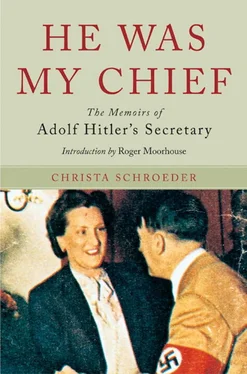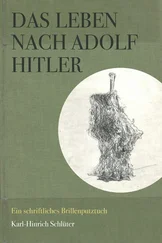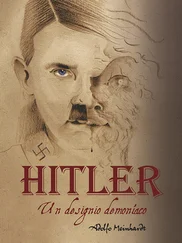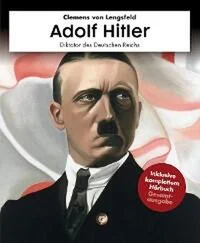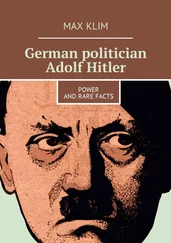Christa Schroeder - He Was My Chief - The Memoirs of Adolf Hitler's Secretary
Здесь есть возможность читать онлайн «Christa Schroeder - He Was My Chief - The Memoirs of Adolf Hitler's Secretary» весь текст электронной книги совершенно бесплатно (целиком полную версию без сокращений). В некоторых случаях можно слушать аудио, скачать через торрент в формате fb2 и присутствует краткое содержание. Город: Barnsley, Год выпуска: 2012, ISBN: 2012, Издательство: Frontline Books, Жанр: История, Биографии и Мемуары, на английском языке. Описание произведения, (предисловие) а так же отзывы посетителей доступны на портале библиотеки ЛибКат.
- Название:He Was My Chief: The Memoirs of Adolf Hitler's Secretary
- Автор:
- Издательство:Frontline Books
- Жанр:
- Год:2012
- Город:Barnsley
- ISBN:978-1-7830-3064-4
- Рейтинг книги:4 / 5. Голосов: 1
-
Избранное:Добавить в избранное
- Отзывы:
-
Ваша оценка:
- 80
- 1
- 2
- 3
- 4
- 5
He Was My Chief: The Memoirs of Adolf Hitler's Secretary: краткое содержание, описание и аннотация
Предлагаем к чтению аннотацию, описание, краткое содержание или предисловие (зависит от того, что написал сам автор книги «He Was My Chief: The Memoirs of Adolf Hitler's Secretary»). Если вы не нашли необходимую информацию о книге — напишите в комментариях, мы постараемся отыскать её.
He Was My Chief: The Memoirs of Adolf Hitler's Secretary — читать онлайн бесплатно полную книгу (весь текст) целиком
Ниже представлен текст книги, разбитый по страницам. Система сохранения места последней прочитанной страницы, позволяет с удобством читать онлайн бесплатно книгу «He Was My Chief: The Memoirs of Adolf Hitler's Secretary», без необходимости каждый раз заново искать на чём Вы остановились. Поставьте закладку, и сможете в любой момент перейти на страницу, на которой закончили чтение.
Интервал:
Закладка:
The Personal Adjutancy now underwent expansion. Julius Schaub’s [27] Julius Gregor Schaub (b. 20.8.1898 Munich, d. 27.12.1967 Munich). 31.1.1917 conscripted; spent most of the First World War in military hospitals either as an attendant or patient; 10.10.1920 joined NSDAP; 1923 active role in putsch, fled to Austria; 20.4.1924 arrested on border at Salzburg, sentenced to 18 months at Landsberg; released 31.12.1924, next day appointed Hitler’s private valet; SS-Obergruppenführer and Reichstag deputy; at war’s end released by Hitler; fled to Kitzbühl using alias ‘Josef Huber’; 8.5.1945 detained by US forces; 17.2.1949 released.
desk was there. He was Hitler’s factotum and had followed him like a shadow since 1925. A typical Bavarian, he was probably the only person who knew all Hitler’s intimate and personal secrets. Schaub was not very prepossessing. He had rather bulging eyes and limped because he was missing some toes from frostbite in the First World War. This handicap was perhaps the reason why he was so irritable. He was ever suspicious and additionally very inquisitive, and since he boycotted anybody not to his liking affection for him in Hitler’s circle was very limited. Schaub had trained in pharmacy and after the First World War worked at the main supply office in Munich. He joined the NSDAP early on and came to Hitler’s attention as he limped around the NSDAP meetings. He was involved in the 1923 putsch. This earned him some jail time which he spent with Hitler at Landsberg am Lech. After early release he became Hitler’s constant companion from January 1925. He was so loyal to Hitler that at his request he gave up smoking, but not alcohol. Hitler knew that Schaub liked his tipple, and finally abandoned the struggle to make Schaub teetotal. When told that Schaub had been hitting the bottle at a reception Hitler made a despairing gesture with his hand and sighed: ‘Yes, I know, it is sad. But what can I do, I have no other adjutant.’
After taking power Hitler needed a qualified valet, and Schaub was retained to handle all his confidential affairs. He kept all Hitler’s secret files in an armoured safe, scheduled the important birthdays and made lists of presents. [28] The list of presents was arranged by donor, article and year. For the 1935 and 1936 lists see BA Koblenz R43 II 967b, sh. 27–31.
Since Hitler never carried a pen or pencil on his person, in the early years of power it was always: ‘Schaub, write this down!’ Before Martin Bormann ascended into Hitler’s close circle, Schaub was always Hitler’s mobile notebook. Schaub also handled some of Hitler’s financial affairs, settling invoices and so on. He carried Hitler’s loose change, since the latter did not like money on his person.
One day a pretty young girl brought a letter to the Braunes Haus for Hitler’s personal attention. In it she described her poverty-stricken circumstances. I think it was December 1936. Her fiancé, an Austrian, had done much for the Nazi Movement and was on the run to avoid arrest. She begged Hitler to find him work, for she earned very little herself and the couple was keen to marry. Hitler checked the details and finding them true found the man a position. Naturally without their knowledge Schaub had to rent the couple a two-room flat and furnish it (carpets, bedding, curtains, furniture). Then a Christmas tree was set up with the usual adornments and the candles lit while Schaub fetched the young couple in the car. That they were overjoyed goes without saying.
It was also one of Schaub’s duties to visit variety performances and theatres at change of programme in order to keep Hitler informed whether a visit might prove rewarding. Schaub often recalled with pride that his mother, who died in the 1908 Messina earthquake, had been a dancer. That was probably the reason why he was so fond of dancers and cabaret artists. When he had to ring up actresses and dancers inviting them to the Führer’s flat for an evening chat [29] Schroeder explained that since there was no dancing at Hitler’s banquets in the Reich Chancellery, he invited singers from the Berlin Opera and dancers from the theatrical operas and the Charlottenberg Opera. Every year he threw a banquet for artists and another for industrialists, the main purpose of these being to raise money for Winter Relief Work. During the Berlin Olympics a great banquet was held at the Reich Chancellery for all competitors. A large reception was arranged for the Party at NSDAP HQ in Munich every year.
he could even be charming. He was an enemy of the gutter press, which was a big plus point with Hitler.
After Wilhelm Brückner was sacked by Hitler in 1940, Schaub received the title ‘personal adjutant’ with the rank of SS-Gruppenführer, as from 1943 SS-Obergruppenführer. This position often brought him into situations which he was not competent to handle. It made no difference to Hitler. When in April 1945 he told Schaub to destroy all personal property at the Berghof which might suggest to people a female presence, and all files and papers there and at the Munich flat, Schaub obeyed without question.
From the SS bodyguard stationed around the Führer apartment a mature SS-Führer [30] Paul Wernicke (b. 14.1.1899 Ribbeck/Templin, d. 6.8.1967). 1930 joined SS; attached to Sonderkommando Der Führer at the Reich Chancellery, February 1933; entered Personal Adjutancy 2.5.1934; dismissed along with Brückner by Hitler 18.10.1940 with the observation: ‘I am sick of the problems in the Adjutancy’; to LSSAH 2.7.1941; Cdr, Div-Staff HQ, Eastern Front, rank of SS-Obersturmbannführer.
trained in commerce was selected for service in the Personal Adjutancy and to handle our telephone exchange. SS-Obersturmbannführer Paul Wernicke had good office experience, was capable and tidy and soon made himself indispensable to Brückner and Schaub, neither of whom had a clue how to run an office. As the pair of them had plenty to do elsewhere they gave Wernicke and me a free hand and so we kept the office work in the Personal Adjutancy flexible and fairly unbureaucratic. Wernicke soon proved himself an important and reliable colleague.
Things changed when Hauptmann Wiedemann [31] Fritz Wiedemann (b.16.8.1891 Augsburg, d. 24.1.1970 Fuchsgrub). 1.1.1935 adjutant at Personal Adjutancy as NSKK Brigade-Führer; 1938 Reichstag deputy; March 1939 consul-general at San Francisco; July 1941 expelled from United States with all German diplomats; November 1941 consul-general Tientsin (China); 18.9.1945 brought to Washington; 5.8.1948 released from internment.
was appointed Hitler’s adjutant. As regimental adjutant with 16. Bavarian reserve infantry regiment, Regiment List, in which Hitler had served as despatch runner, Wiedemann had been Hitler’s immediate superior. Released from the Reichswehr in 1919, Wiedemann studied political economics in Munich. In the 1920s he met Hitler again at a regimental reunion, where he was offered the opportunity to lead the SA, which Wiedemann turned down. He next met Hitler by chance in December 1933 when he was in financial difficulties after the failure of a dairy enterprise in which he had invested. When Hitler asked how things were going, he replied: ‘grim’. Hitler offered him the post of adjutant, which he accepted at once. After an eleven-month training period with the staff of Rudolf Hess at the Braunes Haus in Munich, Wiedemann took up his post as Hitler’s Adjutancy on 1.1.1935 at the Reich Chancellery in Berlin, where he was in principle Brückner’s office replacement. As Brückner was not an office person, and tended to put things off for tomorrow, the adjutancy correspondence and filing was in something of a mess. Wiedemann combined his work as adjutant with a re-organisation of the day-to-day office procedures in the Personal Adjutancy and increased the staffing level.
Интервал:
Закладка:
Похожие книги на «He Was My Chief: The Memoirs of Adolf Hitler's Secretary»
Представляем Вашему вниманию похожие книги на «He Was My Chief: The Memoirs of Adolf Hitler's Secretary» списком для выбора. Мы отобрали схожую по названию и смыслу литературу в надежде предоставить читателям больше вариантов отыскать новые, интересные, ещё непрочитанные произведения.
Обсуждение, отзывы о книге «He Was My Chief: The Memoirs of Adolf Hitler's Secretary» и просто собственные мнения читателей. Оставьте ваши комментарии, напишите, что Вы думаете о произведении, его смысле или главных героях. Укажите что конкретно понравилось, а что нет, и почему Вы так считаете.
